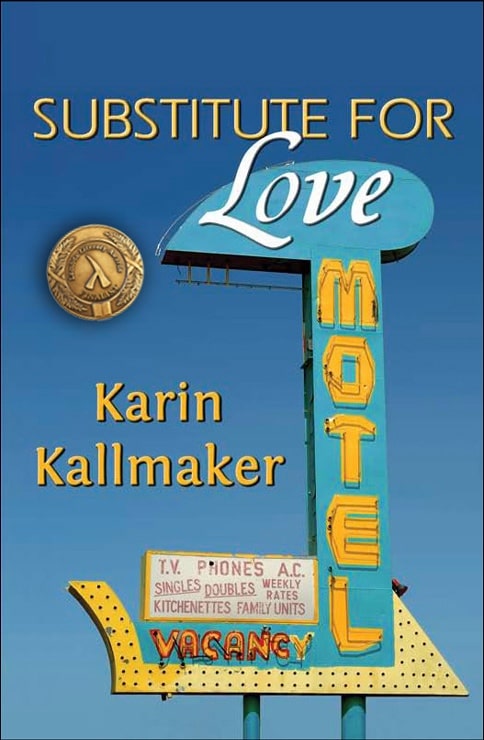Chapter One
Rain spattered against the window again and Holly Markham glanced away from her work to consider the storm's severity. High winds, streaming rain - a typical southern California winter storm. An inconvenience, but nothing more than that.
She took a moment to watch drops merging and separating as they wandered down the pane. It seemed like a random dance, but she amused herself by considering what equation would express the movement of raindrops down glass, taking into account the variable wind velocity, the accumulation of grime, and the mass of each drop. Very few things in nature were truly random.
With a sense of minor reluctance, she returned her attention to the actuarial data spread over her desk. It wasn't nearly as fascinating as raindrop patterns, but anything to do with numbers never failed to hold her interest. Average medical expense for the most common workplace accidents, geographic incidence and regional health care prices were just a few of the variables that help set Alpha Indemnity's worker's compensation insurance policy pricing. Clay characterized her job as the underbelly of modern business. He was right. But it paid very well and made use of her bachelor's degree in mathematics. She was not defined by her job. It was just a necessary evil.
A shadow blocked the light on her paperwork and she glanced up.
"The great man needs you. Same old, same old." Tori had a stack of new printouts under one arm. Holly recognized them as the growing presentation deck for the pricing committee's semi-annual meeting. It had been originally scheduled to be sent out next week, but late last night the deadline had been brought forward to tomorrow. Tori was swamped.
"I'll be right there. Have some M and Ms," she suggested, gesturing at the candy dish on her desk. Tori's expressive brown eyes were full of stress.
"Thanks." She munched appreciatively. "I don't remember it ever being this hard to break in a new actuary."
Holly shrugged. "His tension level is a bit high, isn't it?" She'd noticed Jim Felker's tendency to go into a tailspin every time some piece of information was unexpected, no matter how trivial or how easily resolved. Tori, in particular, had come in for more than her fair share of reprints and verifications.
"I'd give anything for your little trick with the numbers." Tori took a couple more M and Ms and headed for her desk.
Holly fortified herself with a few of the little chocolate pills and walked up the row of cubicles to Jim's office. Of all the failings Clay had helped her overcome, chocolate - the miraculous fusion of sugar, caffeine and fat - was the one she'd never conquered.
Jim was in a tailspin, big time. "Holly, you just have to look at this mess. None of these arrays look right to me." What hair Jim had stood on end. His black-rimmed glasses were askew.
She examined the columns for a few minutes. Jim at least knew when to leave her alone. Arrays of numbers, grouped in regional sequences and presented with corresponding standard deviations - it was the simplest of math functions. Finally, she said, "The totals are fine. They seem reasonable based on the inputs."
"How can that be? Look at this column. Fifty items, everything starts with one and yet the total is nearly one hundred. That just doesn't make sense."
Patience - her one virtue that Clay agreed she had in plenty - came easy to Holly. "It's like the total at the warehouse store. I could get ten items, all of them under ten dollars. Statistically, given an even spread in the array with the assumption that nothing is under four dollars, I'd expect my total to be around one standard deviation - sixty-five to seventy-five. But it's always pushing ninety. That's because the spread isn't even. The items are under ten, but by pennies instead of dollars. So my total is statistically high."
Jim was looking at her as if she telling him a long, involved anecdote about a vacation she'd taken as a child.
She pointed at the array Jim was using as an example. "The array is unusually weighted on the upper end. That's what seems strange to me. You've got very few one-point-ones and a lot of one-point-nines." It was no surprise to her that medical costs continued to rise on a per injury basis.
"So Tori didn't pull the right data?" He made a noise under his breath and shook his head. "Some people..."
"The download descriptors look right to me," Holly said quickly. "But these units might be moving up in a trend. Which means next quarter they could go up over two."
He made a note, but so quickly he almost caught Holly rolling her eyes. He was the actuary - he was the one who was supposed to wonder why data was unexpected, not just assume that the totals on the report were wrong.
She smiled sweetly. "Did you need anything else?"
Reyna, from Chapter Five
Tank had found the motorcycle for her, refurbished it and then registered it in his own name, though she would be the only rider. It was a minor informational fraud, Reyna had rationalized. He chattered about the idiosyncrasies of Yamaha bikes and 750 cc's, but Reyna only saw the silver name melded into the black body: Virago.
Tonight, it fit.
Borrowed leather gloves and a black helmet transformed her from a research and media specialist for conservative causes to unrestrained biker chick. It felt wonderful.
She realized Tank was waiting for some acknowledgment. "She's beautiful," she said belatedly, but with feeling. The engine purred so cool and clean she didn't even have to raise her voice. Kim had taught her to ride. Her father had never noticed her driver's license also allowed her to ride motorcycles, or he would have surely told her to give it up. The link between bike and dyke was too close.
Cash had been all Tony needed to fix Reyna up with something—he just wanted to see another beautiful bike on the road. He hadn't asked many questions. He was still enough of an anarchist to like the secrecy and the tax-free income. She had plenty of money of her own. The Institute or her father paid for almost all her expenses. Her after-tax income was embarrassing, and yet it couldn't begin to cover the medical bills that mounted up with each of her mother's dialysis treatments and trips to the ICU. What she had saved up so far would get them about eight months before there was nothing left. But she kept saving and investing because sooner or later, money would mean independence.
She withdrew hundreds of dollars in cash a month but spent little of it. The rest was squirreled away in her apartment for things she wanted to buy with no way for her father to find out—like a motorcycle, or a motel room for a few hours.
She parted from Tank with a wave. With the thrill that only a completely forbidden activity could bring, she headed for the open road, feeling for the first time in years that eyes were not on her every move.
For the next thirty minutes, just riding was enough. She almost felt like she could take the bike back and it would be enough to dance around the black hole and know she wouldn't fall in. She could smile tomorrow, cooperate, listen to clients who described gays as pedophiles, lesbians as man-haters, feminists as Nazis, the NAACP as radicals, amen, world without end. She could help them write their speeches, twist research to suit their arguments, find new ways to present hate disguised as morality. It was what the Putnam Institute did, and she was good at it, a real chip off the old block.
It was from an outraged male client that she had learned about the monthly ladies' night at the nearest gay bar. Wasn't it outrageous that women who ought to be ashamed of themselves would parade around as if they had a right, dance to that disgusting music, cruise for perverted sex, and so close to where they lived? Reyna's heightened perception had detected the undercurrent of salacious arousal at the idea. Coping with her own revulsion, she had almost missed what the information could mean to her.
She cycled a cloverleaf to head west on the 405, leaning hard into the turn as the wind billowed her jacket open. The air was like ice but it made her feel even more alive. Orange County was the conservative center of California politics, and some neighborhoods were little better than restricted communities. The Putnam Institute was located in the county's political heart, Irvine, and nestled deep in Bonita Canyon, a few miles from the University of California campus.
She left it all behind, whipped past the John Wayne Airport, then a short jaunt north to the border zone between Costa Mesa and Santa Ana. The bike didn't want to slow down, but she followed the route she had memorized. Another generic L.A. boulevard gave way to a still busy strip where restaurants were only now beginning to close their doors. At the far end she turned into a parking lot choked with cars.
She cruised slowly past the front door to Jack's. A small sign indeed proclaimed it Ladies' Night. Even over the vibration of the bike she could feel the bumping pulse of the music inside. She eased into a spot between the nose of a Subaru SUV and the wall of the club. With the engine off the music was even more pronounced. Above that she heard the babble of women's voices.
It hurt to be so close and not be part of it. She kept her helmet on until she was inside, then checked it, the gloves and her jacket with a pouty, bored blonde. The ten-dollar bill she tithed to the doorkeeper trembled in her shaking hand.
She stepped inside and let Madonna carry her to the dance floor where it was dark and no one cared that she was dancing alone.
* * *
She never learned the woman's name. She didn't have to know. It was better that way. What she didn’t know her father would never learn. It was just for tonight, just for an hour, maybe two.
Her teeth felt sharp on Reyna's throat. From a mutual recognition on the dance floor they had moved to the outdoor patio, which was screened from the outside world by thick shrubs, and dark enough to ignore what other couples were doing. She heard a gasp nearby, knew what it meant and wanted to feel that gasp herself, to take and be taken. She moaned and unbuttoned her blouse, eager to be naked, to be skin to skin with this stranger. She was a woman and that was all that mattered.
"We're going to get tossed if you show any more skin," the woman murmured. "But if you want to show it, we could get more involved in my pickup—it's parked outside."
In her father's world it was sordid, but how could it be to her? She had to hide, lie, disguise herself to be here, and her father's world drove her to those extremities. That she could find any kind of bliss, no matter how short-lived, under these circumstances was a matter of solace. If this was all there could be, she would survive on it. The mattress that occupied the entire bed of the pickup was meant for just this purpose, as were the thick curtains that darkened the windows of the enclosing shell. Privacy, anonymity—it was what she had come there for, and it felt like salvation.
How could anyone give this up? God had given her the capacity to love this, to share this intimate act with another woman. Wouldn't turning her back on it be hubris? Who was she to deny how God had made her?



